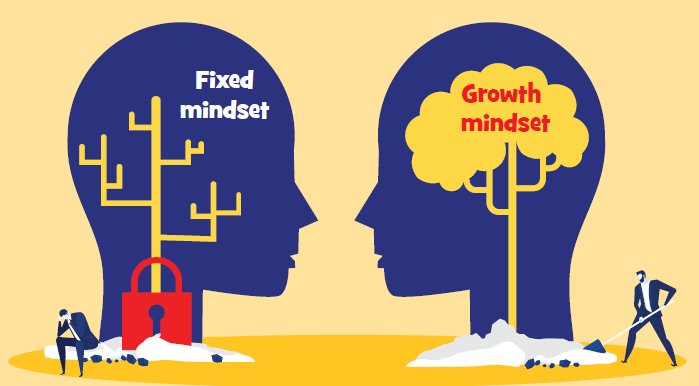What is a growth mindset?
A growth mindset is a belief that our basic abilities can be developed and improved through dedication and hard work. Without a growth mindset, we don’t exert the required effort and so we remain perpetually stuck. With a growth mindset, we can break through the sense of being stuck and achieve the results we desire, whether that be at work, in our relationships, or in other aspects of our lives.
Why does a growth mindset matter?
If we have a “fixed mindset,” we may shy away from challenges because we do not want to feel embarrassed or humiliated in front of others. But this can be problematic because our fear of making mistakes can lead us to avoid challenges and new experiences. Experiences which would help us grow, improve ourselves in important ways, and create the life we desire. If we have a “growth mindset", we enjoy challenges, despite the risk, usually because we value learning and growth more than whether others think we know what we’re doing. And because we’re always trying new things, we often don’t know what we’re doing. Still, those of us with a growth mindset often build new skills more easily because we believe we can and so we really work at it. Developing a growth mindset could contribute to a fuller, more meaningful life because the vast number of experiences that you encounter will be considerably broader.
15 easy steps to develop a growth mindset
Changing one’s mindset from a fixed mindset to a growth mindset may seem like a difficult task, but by taking small steps, you can build a growth mindset.
Here’s how:
- Acknowledge and embrace imperfection in yourself and others: after all, this is what makes us individuals.
- Face your challenges bravely. If you find yourself terrified in the face of a serious challenge, stop and reframe the situation in your mind.
- Pay attention to your words and thoughts. If your thoughts or words are low or dark, the results will also be low and dark. Replace negative thoughts with more positive ones to build a growth mindset.
- Stop seeking approval from others.
- Become more authentic. Be yourself. Pretending to be someone you are not, disrespects who you really are.
- Cultivate a sense of purpose. Does your life feel like it is purpose-driven? If yes, define for yourself what that purpose is.
- Redefine “genius". We all have strengths and weaknesses. Explore and appreciate your strengths, and work to improve your weaknesses.
- Turn criticism into something you can learn from. The purpose of criticism is to make things better.
- Value the process over the end result. During the process, you learn and grow.
- Learn from the mistakes of others.
- It is OK to say “not yet”. When struggling with a task, remind yourself that you just haven’t mastered it yet. If you stick with it, time and practice will lead to improvement.
- Take risks in the company of others. Try not to take yourself too seriously. Be willing to make mistakes in front of others, because if you’re growing, this is bound to happen. And making mistakes in front of others will usually get easier with practice.
- Be realistic. It takes time to learn a new skill.
- Speed is not important. When you have a growth mindset, the end results are less of a focus.
- Own your attitude. If you value having a growth mindset, then take the time and make the effort to develop it.
Having a growth mindset means that you embrace challenges, persist in the face of setbacks, take responsibility for your words and actions, and acknowledge that effort is the path toward mastery. You have heard of the statement: “practice makes perfect”.
By choosing to make the extra effort to build a growth mindset, you can make your mental processes work for you. This will most definitely ensure that you get the results you’re looking for and live the life you want to live.
Sources:
• Psychology today: 15 Ways to Build a Growth Mindset. Published 11 April 2019.
• Dweck, C. S. (2008). Mindset: The new psychology of success. House Digital, Inc. Chicago
